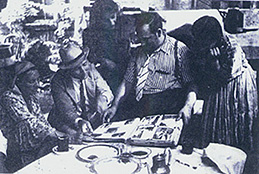


Carlos de Wendler-Funaro
Gypsy Research Collection
c. 1920-1975

BIOGRAPHY
According to information supplied by Mrs. de Funaro, Carl de
Wendler-Funaro was born in Brooklyn ,New York ,on October 12, 1898.
After attending Boys' High School and Erasmus Hall High School in Brooklyn,
he attended the University of Illinois and Cornell University, receiving
a bachelor's degree in entomology from Cornell in 1923. Subsequently, he
taught foreign languages at New York University, the McBurney School of
the YMCA in New York City, Newark Academy
Brooklyn, New York. Carlos de Wendler-Funaro,
second from left, shows
his photographs to a group of Rom, c. 1940. Smithsonian Institution,
National Museum of American History Archives Center
and Wagner College. He began graduate work in the late 1930s, and in 1958
earned a doctorate from Columbia University with a dissertation on "The
Gitano in Spanish Literature." De Wendler-Funaro retired from teaching
in 1963; he died in Tucson, Arizona on February 15, 1985.
Carl de Wendler-Funaro was an avid amateur collector of insects, especially Coleoptera, as well as shells, minerals, stamps, and coins; his insect collections were donated to the American Museum of Natural History in New York.
De Wendler-Funaro's interest in Gypsies, according to his manuscripts, began in childhood. The manuscripts and one published article indicate that this interest continued to be personal, rather than professional, and that he did not pursue his contacts vith Gypsies systematically. (It was not until the late 1940s that anthropologists began systematic studies of Gypsy cultures.) It appears that de Wendler-Funaro sought out Gypsies in fairgrounds, amusement parks and urban storefronts, collecting specimens of language and taking photographs. Irving Brown's letter to de Wendler-Funaro (1929), and de Wendler-Funaro's article in Leisure (1937) refer to his visits to amusement parks. Some of his Romnichel (English Gypsy) subjects recall him as the man who drove along the roads, stopping to take pictures wherever he saw a tent. About 1938 de Wendler-Funaro became involved with a Committee on Gypsy Problems on the Welfare Council, a social service agency in New York City. This involvement may have been an outgrowth of his association vith Steve Kaslov, styled by some a Gypsy king. De Wendler-Funaro seems to have served as Kaslov's secretary and colleague.